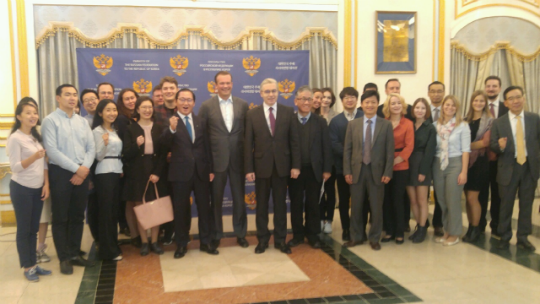-“Special importance must be attached in the Russian Federation to diversify President Moon Jae-in’s diplomacy & to leverage Russia’s role in solving North Korea’s nuclear & missile issues
New Korea Amb. Woo Yeun-keun to the Russian Federation, whose diplomatic mission will be
started on Nov. 8th in Moscow, Russia, garnered special interest in
that he is an alumnus with current Russia President Vladimir Putin
who graduated from the St. Petersburg University.
While Amb. Woo was on hand to stress that he heard from both
political circles or National Assembly, special importance must be
attached in the Russian Federation to diversify President Moon Jae-in’s diplomacy as well as to leverage Russia’s role in solving North Korea’s nuclear issues & missile provocation problems, the 2017 Alumni
Association’s Night for the Alumni of the St. Petersburg University
at home was held at the Grand Hall, Russian Embassy on Nov. 3rd evening.
 |
| Russia Amb. Alexander Timonin (center) encouraing Korean alumnis of St. Petersburg University in Russia while being surrounded by them. |
From the Embassy of the Russian Federation side, Russia Amb.
Alexander Timonin & deputy Maxim G. Volkov in addition to
many diplomats attended the Alumni Night of the St. Petersburg
University to encourage Korean alumni and to forge new friendships
with them. In his welcoming remarks, Russia Amb. Timonin said
he believes Korean alumni of St. Petersburg University in Koreas
would play a big bridge role for deeping bilateral relations as well
as strengthening people-to-people exchanges among other.
For more than 290 years, St. Petersburg University has been
committed to advancing science, generating knowledge and
training outstanding professionals, according to a briefing
presentation by an official of St. Petersburg who joined the Alumni
evening. The University is rich in history – it dates back to 1724,
when Peter the Great founded the Academy of Sciences and Arts
as well as the first Academic University in Russia. The famous
SPbU alumni are a source of pride and dignity, which inspires us
to excel and maximise our potential in research and education, he said.
The following are excerpts of the briefing presentation to introduce
St. Petersburg University. –Ed.
Among our alumni and staff, there is an extraordinary number of
world-famous people, in particular, Nobel Prize winners: physiologist Ivan
Pavlov, biologist Ilya Mechnikov, physical chemist Nikolay Semyonov,
physicists Lev Landau and Aleksandr Prokhorov, philosopher and
economist Leonid Kantorovich. SPbU is also an alma mater for
outstanding researchers, scholars, academics, political and social
leaders: Dmitry Mendeleev, Vladimir Vernadsky, and Dmitry
Likhachev to name but a few. The world owes our University
most prominent cultural leaders, writers and artists: Ivan Turgenev,
Pavel Bryullov, Alexander Blok, Alexander Benois, Sergei Diaghilev
and Igor Stravinsky. Among the University alumni, we are also
proud to mention the leaders of the Russian Government: Boris
Stürmer, Alexander Kerensky, Vladimir Lenin, Presidents of the
Russian Federation Vladimir Putin and Dmitry Medvedev.
Today, three centuries after it was established, SPbU is striving,
as before, to lead research and education on a national and
global scale. By bringing together traditions and innovations, St.
Petersburg University sets the pace for development of science,
education and culture in Russia and across the world.
SPbU fully equips its students and staff for the best of the diverse
range of opportunities for education, research and personal
development: the richest Research Library named after M. Gorky,
a state-of-the-art Research Park, laboratories headed by leading scientists,
museums, a publishing house, sports clubs, a University choir,
orchestras, drama and dance studios and so on.
In November 2009, President of the Russian Federation Dmitry
Medvedev signed a law granting St. Petersburg University and
Moscow State University the special status of ‘unique scientific and
educational complexes, the oldest institutions of higher education
in Russia being of great importance to the development of the
Russian society’. SPbU was granted a privilege to set its own
educational standards and award its own diplomas.
<Why St. Petersburg University?>
Founded in 1724 by Peter the Great, Saint Petersburg University
was to become the first institution of higher education in Russia.
SPbU is a leading Russian university with teaching and research
excellence ranked among the world’s top universities. We are open to cooperation and enjoy strong
ties with the international research and academic community. SPbU
scientists work in almost all fields of knowledge, providing expertise
and consultation in close collaboration with Russian and international
partners. Many outstanding scholars have been a part of the SPbU
community, including nine Nobel Prize winners: the physiologist
Ivan Pavlov, biologist Ilya Mechnikov, physicist and chemist Nikolay
Semyonov, physicists Lev Landau and Aleksandr Prokhorov,
philosopher and economist Wassily Leontief as well as mathematician
and economist Leonid Kantorovich.
Among University alumni are the President of the Russian Federation
Vladimir Putin, Prime-Minister Dmitry Medvedev, Director of the
Hermitage Mikhail
Piotrovskiy, President of the Russian Academy of Education
Liudmila Verbitskaya, mathematicians Grigoriy Perelman and
Sergey Smirnov as well as many others.
St. Petersburg University Today
30,000 students
6,000 staff members
106 undergraduate programmes
165 master programmes and areas of specialization
263 doctoral degree programmes
28 clinical residency programmes
international students from over 70 countries
over 3 000 international students on degree and non-degree programmes
more then 400 partner universities
the best university Research Park in Russia
6,800,000 books in the collection of the University Research Library
diploma issued in Russian and English
12,800 places in the halls of residence
Education Benefits
active student participation in the educational process;
the best realization of a student’s individual potential;
ECTS – European Credit Transfer System;
academic disciplines are designed according to the modular principle;
student exchange programmes with partner universities
internships and work placements at leading Russian and international companies;
access to unique research facilities, technology and full-text electronic databases;
modern educational technologies;
state-of-the-art research equipment;
state scholarships for the best selected international applicants
(free tuition and discountedaccommodation);
on-line application at the SPbU website – www.spbu.ru;
opportunity to master Russian at the Institute of the Russian
Language and Culture.

